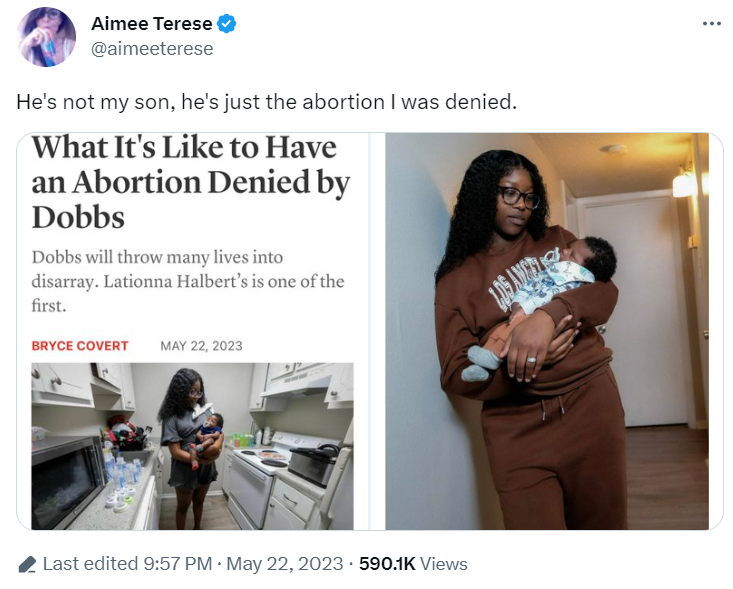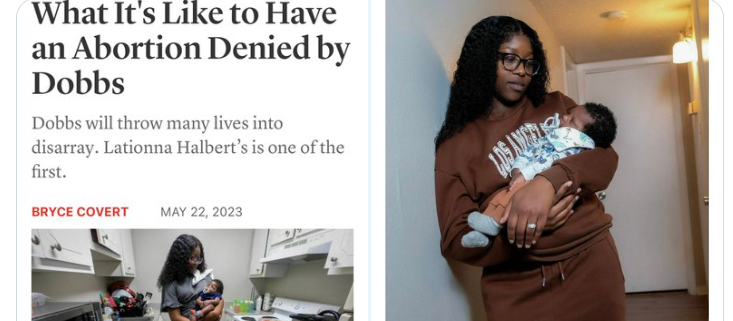Article laments baby boy born because of Dobbs
On May 22, 2023, In These Times published “What It’s Like to Have an Abortion Denied by Dobbs,” which profiles Lationna and her newborn son, Kinglsey. I came across the article because of this tweet:

The tweet already had a whole lot of quote tweets, many of them saying terrible things about Lationna herself, what she must think of Kingsley, and whether he should be placed in a different home. Most of these comments were from people who oppose abortion, although abortion advocates echo similar themes when they suggest abortion bans will lead to increased child abuse and an overcrowded foster care system.
These are huge missteps. The fact that a woman considers an abortion does not mean she won’t love or properly care for her baby.
[Read more – Abortion bans don’t lead to a surplus of unwanted children.]
I read the article searching for a direct discussion of how Lationna feels about Kingsley. The closest I found was this passage:
The only time Lationna was able to really rest was in the morning, when she let Kingsley sleep on her and she drifted off; if she tried to put him down, he immediately started crying. Most of the day he slept silently on her body, nestled on her shoulder or curled against her forearm, tattooed with “Royalty” in big red lettering. She planned to get another tattoo with Kingsley’s name, eventually. Every time she helped Kingsley shift to a new sleeping position, she showered his plump cheeks with kisses.
Bryce Covert, “What It’s Like to Have an Abortion Denied by Dobbs,” In These Times
Author Bryce Covert paints a detailed picture of Lationna’s difficult financial circumstances, implying (or outright stating) abortion would have resolved much of the problem. She quotes Lationna talking about her fears and stresses and stating plainly “We were not ready to have a baby.”
But it’s not clear from the quotes that Lationna would have preferred abortion rather than having Kingsley with a better support system. Covert makes passing references to Lationna’s “mixed feelings” about abortion, her desire to eventually give her older son, Royalty, a sibling, and her and her fiance’s resolve to view Kinglsey as a “blessing.”
Otherwise the questions of Lationna’s feelings toward Kingsley, and toward whether she still wished she had aborted, appear unasked.
According to the Turnaway Study, women who give birth after being unable to get abortions overwhelmingly state they no longer wished they’d aborted. Covert’s article makes no mention of this finding either, despite discussing the Turnaway Study specifically. The article does exaggerate the Study’s findings on economics, though, neglecting to mention that most of the economic disadvantages (for women who couldn’t abort compared to women who could) diminished or disappeared over time.
If anything, Covert’s article implies the struggles of unintended pregnancy and birth are permanent, using a partial quote from Turnaway Study lead researcher Diana Greene Foster (emphasis added):
Most women who had wanted another child later in life, under different circumstances, didn’t go on to have another, because “when they have a child before they’re ready,” Greene Foster says, those better circumstances don’t arrive.
Bryce Covert, “What It’s Like to Have an Abortion Denied by Dobbs,” In These Times
The most egregious omission, perhaps, is when Foster is talking about how the women denied abortion were doing years later, still not mentioning that, despite their economic struggles, they almost universally state they no longer wish they’d aborted. Instead she reduces their lives to downsides (emphasis added):
Greene Foster had initially asked her subjects why they wanted an abortion; years later, she found out: “Everything they were concerned about came true for the people who were denied.”
Bryce Covert, “What It’s Like to Have an Abortion Denied by Dobbs,” In These Times
It’s difficult to read an article like Covert’s. She shows photos of a sweet newborn baby and his mama who loves him, yet spends nearly the whole word count essentially denouncing his birth and existence. I have to remind myself that most pro-choice people view abortion as a way to prevent Kinglsey from coming into existence in the first place, not to kill him once he already exists. They’re not hateful — they’re just horribly wrong.



